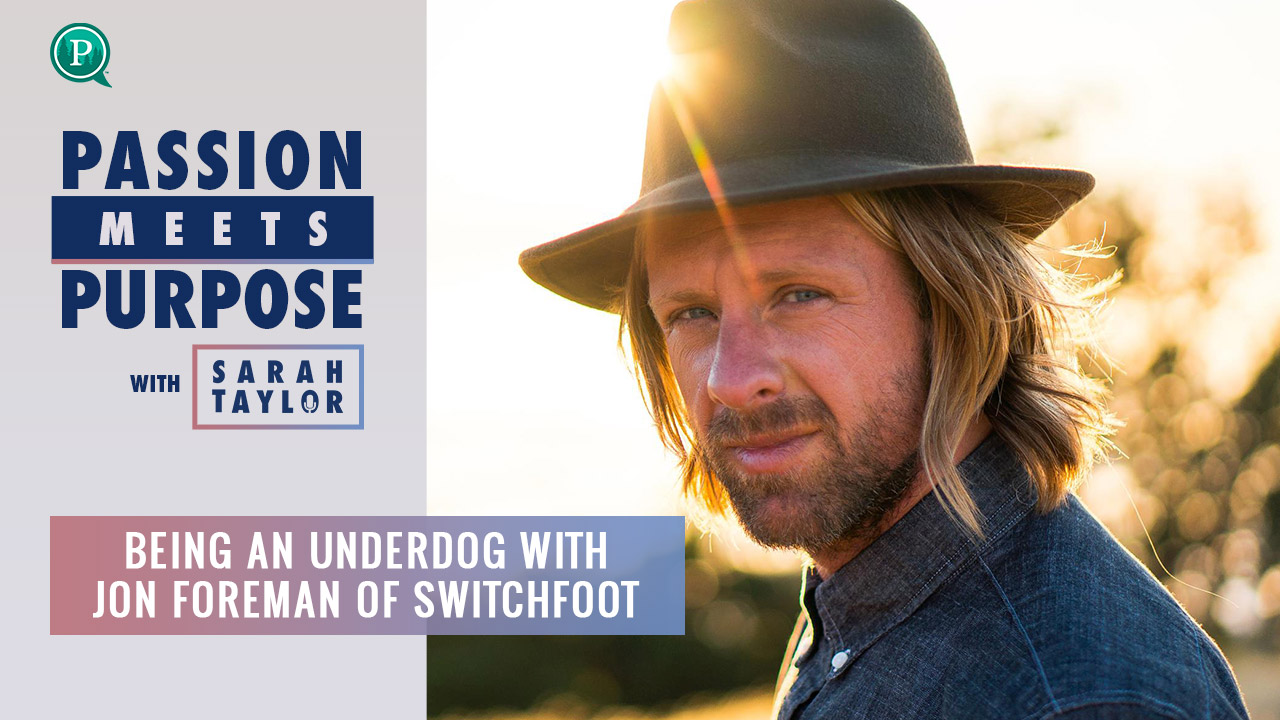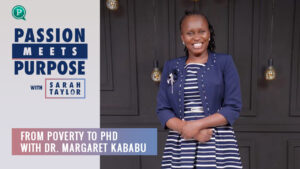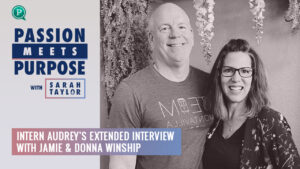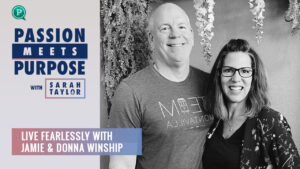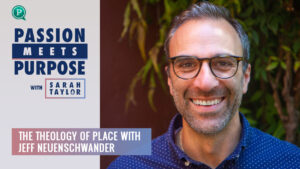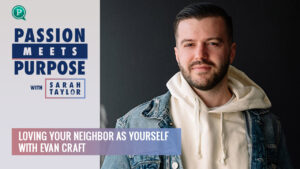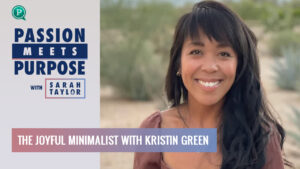You know it’s a fun interview when it starts with a squeal of excitement. Join Sarah Taylor and Jon Foreman from Switchfoot as they talk about being an underdog, their upcoming tour, raising big picture kids, and common bonds among people and music.
Interview Links:
Find Jon: Online | Instagram | Facebook | Twitter
Transcription:
Jon [00:00:12] I think song is the thing that is maybe deepest in the human experience. There are sociologists who believe that song transcends language, that the song came first.
Sarah [00:00:27] Welcome to The Passion Meets Purpose podcast. My name is Sarah Taylor. This is where we discuss the things that you’re naturally good at. Your gifts, your talents, your abilities, and then how do you put those on display for the rest of the world? Let’s jump in with today’s guest.
Jon [00:00:41] Yes, is Jon. How are you doing Sarah?
Sarah [00:00:43] I’m good. How are you, Jon?
Jon [00:00:45] I’m well, thanks.
Sarah [00:00:47] I might have let out an audible when I saw the email that you guys are doing what you’re about to do this year.
Jon [00:00:56] Yeah, I was so excited about it as well. I might have let out a little something like that as well.
Sarah [00:01:01] But does your excitement sound sound like?
Jon [00:01:03] I’m kind of more of a Southern California surfer singer guy, so maybe it’s just more of a smile, I suppose.
Sarah [00:01:11] Yeah. You guys, that’s one thing about you guys. You’re so laid back. And is that just a whole surfer vibe? Like, is this what I need to get rid of my anxiety is to take up surfing?
Jon [00:01:22] I will say that you realize how small your problems are in your face to face with the enormity of the infinite horizon in the form of the Pacific. You know, it really puts everything in perspective.
Sarah [00:01:35] And also, something is healing about that saltwater.
Jon [00:01:38] Yes, there is. Yeah. And, you know, I mean, I do think that’s why we are still a band is because like surfing together.
Sarah [00:01:47] Let’s talk about this record. You’re calling it Our Version. Is that correct?
Jon [00:01:54] Yeah. So The Beautiful Letdown is a wild story. The original album almost never came out. We got dropped by our label just before the record came out, and so we were faced with the awkward conversation within our own band as to do we believe in these songs or not, you know, Is it worth the fight to get them heard or not? And we kind of said, “You know what? No matter what the record label says, we believe in this song. Let’s go.” And somewhere in the next year or so, it felt like people started singing along with us. And, you know, eventually the very label that dropped us, you know, picked this back up after 2 million albums sold. And that’s the story of the Beautiful Letdwon. So we figured 20 years later to celebrate this underdog album. We’re going to make our version for ourselves and all the underdogs out there, and we’re going to play the entire album from start to finish for the first time live in a lot of our favorite cities, and one of them is Seattle, and we’re coming your way soon.
Sarah [00:03:09] So you have to know that those of us that were there in that tiny I don’t even remember the name of the venue, but it was like the size of a small garage. And we were all inside of whatever that place was, you know, as 20 somethings. And now you realize that all of us as 40 somethings are coming back and, you know, our knees and our lower back and all of that, like, there’s been some changes.
Jon [00:03:36] Yes, yes, go on.
Sarah [00:03:37] So what is your plan for, you know, all of us? Are we just going to kind of go back in a time machine 20 years ago and relive all those memories?
Jon [00:03:46] Well, I can’t tell you what’s going to happen. I do know we’re going to play every song from start to finish on that album. And I think the beautiful thing about that record is, you know, there’s a lot of albums and songs that feel like they are trapped in a time machine and like a song, for example, that a friend of mine wrote about his ex-girlfriend that he doesn’t think about anymore. But it’s his big hit and he’s got to play it every night. And, you know, for me, I’m really thankful that the songs on that album kind of transcend that specific time. They still mean so much to me, you know. 24, Meant to Live, Beautiful Letdown, Dare You To Move, This Is Your Life. It feels like I mean it still. And so that’s that’s a beautiful thing. I don’t know what’s going to happen in 2023 playing these songs, but I know that I’m so excited about playing them.
Sarah [00:04:44] Do you like seeing your fans that have…We were talking around here and saying Switchfoot fans are for life. Have you noticed that?
Jon [00:04:52] Yeah, I mean, it is such an incredible community that I do not take for granted. It is a gift to any form of community. I think especially in 2023, is to be celebrated. You know, I think that entropy and divorce and all of those things, they happen to all of us. And yet when there’s something that unites people and I’m thankful for it and to be a part of that I genuinely feel like I’m one of the voices singing the song, not the voice. And that is a gift.
Sarah [00:05:30] Mm hmm. Yeah. Those are my favorite moments at the show, is where the whole crowd takes over. Do you like that, too?
Jon [00:05:37] Yes, I love that. That feels like. Oh, I mean, it’s funny. I’m a reluctant singer. I am a singer of these songs just because no one else would sing them. So I feel like when I hear the rest of the crowd singing and I can drop the microphone, that is victory, not defeat, as is my favorite.
Sarah [00:05:59] What does you know, Jon, today think of when you’re redoing these songs? Like how how do you relate to them still? But how are they different?
Jon [00:06:09] Yeah, it’s so funny because that album was made in two weeks total, which is really fast to have the recording and mixing process all happened in that short amount of time. And so there is a certain magic when we open up a lot of those old tracks where you think, Man, I wouldn’t have done it that way, but there’s something special about it. So some of the things as we recreated this record, some of the things were very easy to beat, some things that we’ve learned along the way about how to do things and other things were, you know, impossible to beat. Where you just say, no, that was that moment. And it is what it is that. That’s what, 20 years that you know. So but 2023 the version, our version this year. I’m so proud of it and it really kind of feels like the kind of an exclamation mark to a record that means a lot to us.
Sarah [00:07:12] I hope you guys have like beefed up the data package on your website because I have a feeling when these tickets go live, I wouldn’t be surprised if like, the server crashes.
Jon [00:07:23] Yeah, we called Taylor Swift and said, “Hey, any tip?”
Sarah [00:07:30] What’s the protocol? Nice.
Jon [00:07:32] Taylor. How do you do it? What do you do here?
Sarah [00:07:36] One fun thing that I love is that, you know, it’s…You’re a band of brothers, but you also have a literal, like, DNA brother in there. And your parents wrote a book on parenting, which is one of my favorites. This was years ago. I got a chance to interview them, and they just dropped all their wisdom about raising big picture kids, which is something that they did with you. Do you want to talk a little bit about your upbringing and how that shaped you?
Jon [00:08:05] Yeah, you know, I mean, it’s so funny because I think you only know what you know, You don’t no one else’s experience, no one else is an expert on someone else’s experience. I think when you’re a kid, you think your experience is everyone’s experience because it’s all you know, you know? And I grew up playing, you know, Led Zeppelin and Keith Green and not really knowing the difference, kind of feeling like, yeah, there’s parts that I like and dislike about both of them. And I think and I look back now and I think, Wow, that’s pretty unusual to have a family that reaches its arms around art like that. And so I do feel like so much of who we are as a band is with the understanding that really what you have is your story, your honesty. And as a songwriter, if you bring that to the table, that is something that, you know, open minded people everywhere will say, “Oh, I want to hear more.” That sounds like a good story or not, you know? But it feels like this egalitarian approach to listening and entering in with compassion. And I do feel like that part of my childhood was rare and I’m thankful for it.
Sarah [00:09:37] You guys are always up for, I feel like almost always up for anything, especially if it involves like serving others. And you’ve been so generous with your time when you come out here to Seattle. Last time you guys were here, you went and did an acoustic show at Seattle’s Union Gospel Mission and Hope Place. And talk to me just a little bit more about you’ve traveled the world, you’ve met all kinds of people. What have you noticed just about people? You always want to spend time with them no matter where you are. You’re very present in the moment. I know that’s part of naturally who you are, but tell me just a little bit more about as someone that’s seen all cultures, all places, what do you see that’s common? A common bond among people and music?
Jon [00:10:19] I think I’m learning to love the inconvenience. And I think we in America, we celebrate convenience and things that happen quick and they’re automated and you don’t have to think about them. And yet, people are not that way. Friendship, love, you know, certainly being a parent, nothing is convenient about it. And yet these are the things that we need and want the most in our lives is things that we value the most. Community, friendship, all of these things that take time and are inconvenient. And I think the beauty of music is that it requires time. It is time travel. You are in a different spot in time when the song ends then when it began. It is not convenient to sit there for, you know, 4 minutes and listen, but it is transformative. And I think that it slows me down when I stop and listen to a song. I’m reminded that true music is live music. That it’s something that you have to experience and you can’t press stop on it. And, you know, I think that my favorite communities are the communities that I’ve encountered around the world, whether it’s like, you know, Tijuana or Bangladesh or wherever where you know, they’re lower in they look you in the eye and they have time for the conversation. Those are my favorite communities. And it’s ironic there’s a a story when we were leaving Seattle one time, we had our bus parked in the parking lot next door to the venue we were playing, and there was a mix up the guy wanted to charge us money for our bus. And we are trying to communicate know we were with the venue. We don’t need to pay. And it took, you know, 15 minutes to get it sorted out. And at the end of it, he said, “Oh, thank you.” And there’s a language barrier at the end of it. He said, “Thank you for the inconvenience.” And I’ll never forget that phrase. It kind of stuck with me. Thank you for the inconvenience. And so that that’s kind of been something I’ve been leaning into. Thank you for the inconvenience.
Sarah [00:12:43] Oh, I love that. Yeah. In order to be thankful for the inconvenience, you have to have that attitude that you just shared that you see in the cultures like Bangladesh that are your favorite, which is where presents presents with the person you’re with is valued above everything else.
Jon [00:12:57] Hmm. Yes. It’s a gift.
Sarah [00:12:58] It’s like the best gift. Especially now. If you give someone full eye contact, it’s almost like, Wow. Well, what did I do to deserve such attention?
Jon [00:13:07] It’s unsettling, right? If someone says, like, How are you doing and they mean it, you’re like, Oh, my goodness, I don’t even know.
Sarah [00:13:17] And then they ask you a question and they listen to your answer and give you a follow up question on what you just said.
Jon [00:13:22] Right. Yeah. Who has time for that?
Sarah [00:13:27] Here’s a kind of a question. You can take it however profound you want to, but kind of in line with everything we just said. You know, we’ve talked about the power of music, but why do we sing? Why do we feel compelled to participate, right? Why does the crowd sing along with you? Why does music and singing reach a different spot inside of our soul than just something being spoken?
Jon [00:13:51] Great question. So I am not a sociologist, but, my mom was. But that’s my degree. But I think that very little of what we do in 2023 is tapping into what it means to be human in any other century other than our own. Most of what I do and the things I interface with, this phone that I’m talking in, even the guitar, a microphone, electricity. My grandfather a hundred years ago, he lived to be 102, passed away recently. He lived in a world where cars were not…I mean, there were other forms of transportation other than cars. Electricity was not everywhere. Certainly not computers, telephones, all the things that we take for granted. And my point is, I think song is the thing that is maybe deepest in the human experience. There are sociologists who believe that song transcends language, that the song came first. You know, and being a singer, I like that theory. If I feel like it, it truly taps into this idea that when, you know, when we’re speaking, there’s a musicality. It’s maybe less than a song, but it’s similar and I think that, you know, previous societies…Even, you know, even 100 and some odd years ago, if you said music sales, you were talking about sheet music. And so the only way that music would exist back then was you had to play it. You had to have someone with a piano or a guitar, and you’d sit around and you’d sing it, and that was your television. And I think that when we sing together, we’re tapping into that thing that, you know, centuries ago that’s what we did around the campfire and that’s what we did when we were walking long distances. And that’s what we still want to do together. Joining us together.
Sarah [00:16:00] I also feel like it’s something that children usually naturally do when they’re little.
Jon [00:16:05] Totally.
Sarah [00:16:06] Before they learn to stop.
Jon [00:16:07] Yeah. So many things that children do naturally that, you know, without any need to be taught that somehow we can’t do when we’re older.
Sarah [00:16:19] You know, whenever I mentioned Switchfoot, it’s so interesting. I get, oh, you know, they influenced my faith or that was my husband and mine’s first concert or like, it’s literally a moment like a mile marker moment with one of your songs or one of your shows that’s like deeper than I love that band, if that makes sense.
Jon [00:16:43] Hmm.
Sarah [00:16:43] Tell me. I know that you hear that often. What do you think it is? Maybe specifically about the Beautiful Letdown or just your career in general and your songwriting in general that causes people to have a faith moment?
Jon [00:16:58] Hmm. I mean, that is a gift. I can’t say that I know where it comes from. I am thankful for that. And I think I mean, all our goal has been we’ve been really transparent with our goal from the beginning is just to be honest. And I think honesty might encourage honesty. You know, if maybe it’s like the laws of thermodynamics where, uh, you know, an object remain in rest unless it’s acted upon by another object of reciprocal response. You know, the idea that when someone encounters honesty, maybe it encourages honesty within them.
Sarah [00:17:40] And I think that’s really accurate. Also, I was not expecting you to quote thermodynamics in this interview, like from memory, like…Where is that living inside of you?
Jon [00:17:49] I dropped out of college, but I loved it.
Sarah [00:17:54] So you are a lifelong student I feel like.
Jon [00:17:57] I do have a lot to learn. And I love the posture of a student because I think it’s true. And I think that the moment you identify as the one who knows, it’s a place of vulnerability, not strength. And I think it makes you vulnerable to all sorts of blind spots. We all got blind spots and I’m sure I’ve got mine, but I think it’s better to upfront say, “Yeah, I’m not sure. Let’s find out.”
Sarah [00:18:28] One of the experiences I’ve had, I think it was two shows ago? I don’t know when you guys were out here and my husband went with me and Joel is his name and he doesn’t cry a lot at stuff, you know? So we’re at your show. And my favorite moment is always when somebody or five people bring a big white sheet that says Where I belong, and you guys start that song and everyone’s just singing. And I look over and he has one tiny maybe tear that has not left the corner of his eye, but just, like, hangs out right there. We’ll call it glistening. A glisten. And I pointed and I smiled and I said, “Oh, That one got you. It got you.” And he’s like, “What? I don’t know what you’re talking about or whatever.” And it is our joke to this day. And so when I tell him you’re coming back, I’m like, “Oh, the song is going to get you. It’s going to get you,” You know? And so, yeah, that’s, that’s my song of you guys. And I know it’s not on the Beautiful Letdown, but I’m going to throw it in the request line. Are you only playing that record?
Jon [00:19:32] So we’re going to play that record start to finish and then we’re going to play songs off for the rest of them. It’s so funny. That song is also it gets our our manager as well. And he’s not at all that guy, but every time he’s like, you know, I have to go to the other room when you play that one.
Sarah [00:19:51] So you know what I’m talking about. He gets the glisten.
Jon [00:19:53] Yeah, yeah, exactly.
Sarah [00:19:58] There’s something about that one that can just break a man down, Jon.
Jon [00:20:04] I mean, the funny thing is I want to just point out I’m not immune to that. I kind of embrace that. There’s a line in that song that says I’m not sentimental. The skin and bones is a rental. But the truth is I actually probably am sentimental. So there you go.
Sarah [00:20:21] Yeah, I think we all know that, but at least you can admit it now. What are your closing thoughts, Jon?
Jon [00:20:27] No, you know, I just think I look back with such gratitude at where this album has brought us. You know, it has brought us around the world. And I’m so thankful for these songs. I do feel like songs are things that come to you rather than things you create. A chair is something that doesn’t come to you, you know? It’s more like fishing, I suppose, where you put your hook in the water and see what happens. And I’m so thankful that these songs came our way. And then I’m thankful for the journey we’ve been on since, you know, even the record label that dropped us. I’m thankful for all of it, you know, And I’m so excited to be, you know, kind of throwing this birthday party for this record. That means so much to us.
Sarah [00:21:16] I want you because we have a couple minutes left. I want you to talk a little bit more about how songs come to you. Tell me a little bit more about how you receive a song like that. You don’t create it. It finds you.
Jon [00:21:28] Yeah, I think that maybe surfing is a good analogy. You look around you find the part that looks inspiring, that might produce something. And you put you’re wet suit on and you wax your board and you paddle out. Yet you have no control over the ocean and you enter knowing that you do not control it. You can get better at learning what’s happening. You can get better at riding waves, but you cannot create them. And I think the music the same way where you enter in with this humility and this gratitude, where you say. “I don’t know what it’s going to be like, but I’m excited and I’m present to the moment and I’m here.” You know, I think that there’s a certain amount of being in a receptive posture in both surfing and in music songwriting.
Sarah [00:22:30] Yeah, I can totally see that. Do you have like a kind of a how do you get in that zone?
Jon [00:22:37] I feel that wonder is imperative for songwriting and for any creative act. I think that to be wondering and curious is a gift that is often not viewed as a gift by our contemporary culture. I think to be unsure is post-Enlightenment almost a curse word or something, you know? And yet science is the process of wondering and presenting a hypothesis and proving it or disproving it. You know, ultimately, it’s our attempt to approximate what is happening around us and understand it. And I think songwriting is the same thing where you wonder you say are all this feeling I have within me. I’m going to pick at it for a little while. I’m going to dig in the soil and see what lies beneath the surface. And so, yeah, wonder is the first step.
Sarah [00:23:43] It’s another thing that kids have until they learn not to.
Jon [00:23:47] Yeah. Yeah. And I think that irony, too, as you become better at songwriting. I’m putting that word in quotes. “Better.” You can learn the wonder, You can unlearn it, and you can lose it. And I think that’s where it has to be rediscovery. You have to find the wonder somewhere else. So you get really good at three or four chords on the guitar. You have to find new places to wander. You get really good at writing about a certain subject. You have to find a new new soil to dig in.
Sarah [00:24:24] I think that works for people to actually like the people closest to us. Like I’m thinking of my family or my kids or whatever. Like, I like to, you know, just when I think I haven’t figured out. I like to find that next layer.
Jon [00:24:35] Yeah. I mean, I think women instinctively do this pretty well. I mean, maybe better to just typecast women and men. I think women do it better than men in general is to be a little bit more big picture and and understanding that the ocean can change, that it has many different moods and yet it’s the same ocean. And to be accepting of that and curious and wondering and yeah, it’s something again. I’m a student and trying to trying to get better at it.
Sarah [00:25:10] Final question for you. I squeeze out every last drop here.
Jon [00:25:14] No, all are great questions.
Sarah [00:25:17] Oh, thank you. Final question for you. Unless I come up with another one is, you know, you inspire a lot of people. Who is someone that inspires you and why?
Jon [00:25:28] There’s a lot of people that come to mind. Ironically, I’m the one that comes to mind. At the top of my mind is my daughter. She is so inspiring to me. She had a brain injury when she was very young. And she is an overcomer in ways that still inspire me. It’s kind of a strange, funny thing to say. But when I surf, when there’s a big swell, a larger waves are coming through. I think of her and her learning how to crawl and walk against challenges and setbacks and that is I think, incredibly inspiring. To me, that’s the first thing that comes to mind.
Sarah [00:26:25] Daisy?
Jon [00:26:26] That’s right.
Sarah [00:26:27] That is so beautiful. That analogy.
Jon [00:26:30] Hmm. Yeah. I mean, I think we all face big waves in different ways. And I don’t think you have to be in the ocean to find some analogous form of terror or fear, disappointment. Whatever it is.
Sarah [00:26:49] So wonderful. Yeah, that was my that was my last question. So I’m just so thankful that you guys are doing this this year. And I speak for pretty much every person at the station that knows about this. Like, every single person is like, I’m there. Is Seattle a little bit more special for you guys than, you know, some other city? Just say, yes.
Jon [00:27:13] Of course. I love Seattle. We have so many amazing memories in Seattle. So Seattle was one of the first few places that we toured where we were able to play there and and have people show up. You know, it sounds like you were at one of those shows.
Sarah [00:27:33] Yeah. Little intern me.
Jon [00:27:35] Maybe dropping out of college wasn’t a horrible decision. That was Seattle was absolutely one of those places.
Sarah [00:27:41] Oh, good, good. Well, you’re going to get just as much of a warm reception, if not more, because you’re going to make all of us 40 somethings feel young again. So thanks for that.
Jon [00:27:51] Well, we can feel young and we can feel old. People do it together.
Sarah [00:27:55] Yes. Yes. Jon, thank you so much for your time. My best to you.
Jon [00:28:00] Likewise. Thanks for your great questions as well.
Sarah [00:28:07] Thanks so much for being here today on The Passion Meets Purpose podcast. We’re going to talk again in two weeks. But in the meantime, if you want to do us a huge favor, obviously you know this by now. If you leave a review, it really helps others to find this podcast. It also helps us to make it better and then you can contact us any time at purposely podcasts. Until next time. Thank you.
Follow this podcast:

